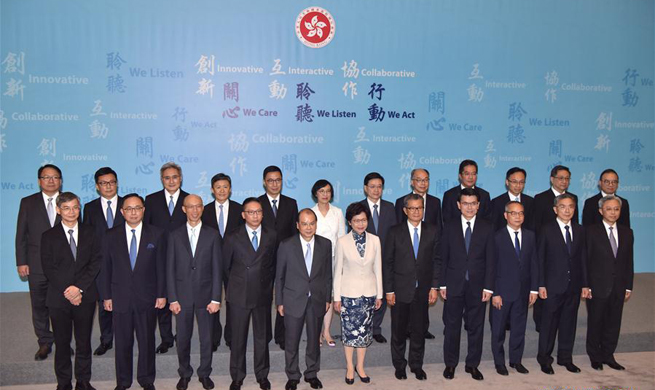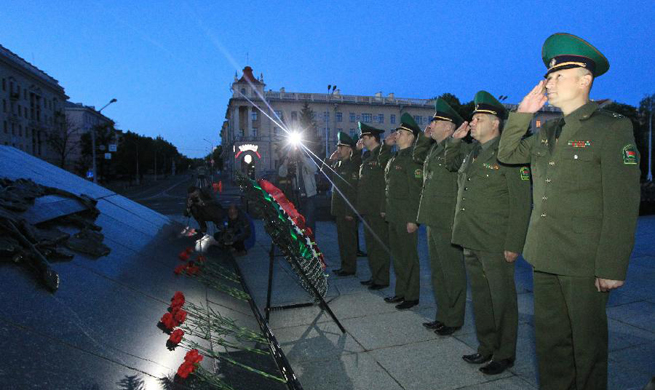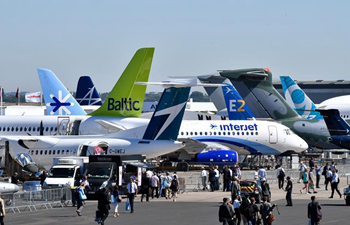by Keren Setton
JERUSALEM, June 22 (Xinhua) -- The chance of restoring the Israeli-Palestinian peace talks remains slim, despite the new diplomatic efforts made by the United States with the recent visits of senior White House officials to the region, experts said.
Jared Kushner, son-in-law of U.S. President Donald Trump who also serves as chief Middle East adviser, and Jason Greenblatt, Trump's envoy on the peace process, have just held talks with Israeli and Palestinian leaders in the past days, in an attempt to jump start the stalled peace process.
The White House called Kushner's meeting with Israeli Prime Minister Benjamin Netanyahu as "productive," but made no comment on his meeting with Palestinian National Authority (PNA) President Mahmoud Abbas.
Experts said that Kushner and Greenblatt are entering a territory where all their predecessors have failed before.
Ido Zelkovitz, a policy fellow at the Mitvim Institute for Regional Foreign Policies, also the head of Middle Eastern Studies at Yezreel Valley College, said the Trump administration seems to bring a new approach to the conflict, but the optimism is still reserved.
"Kushner comes from the business world ... maybe such an approach can provide a fresh start and neutralize emotional influences," Zelkovitz told Xinhua, but adding that these issues cannot be resolved only by looking for mutual interests.
"I do not think history and feelings can be ignored," he said.
The Palestinians want an independent state and the majority of Israelis are increasingly unwilling to make the concessions.
The current Israeli government was not elected in order to promote Palestinian independence, rather, on the contrary, to fortify Israel's presence on the West Bank which Palestinians covet for their future state, Zelkovitz said.
He predicted that the end result will "most likely be similar to previous attempts - failure to agree," as getting the parties to the negotiating table is the easier task, while the thorny issues that prevent a final status agreement still exist.
The Netanyahu administration is dominated by right-wing nationalists who are very vocal in their objection to a Palestinian state, he said.
Avi Pazner, a former Israeli diplomat, told Xinhua that though the U.S. envoys no doubt received a warm welcome, "but it can definitely spark controversy within the (Israeli) government."
It has been three years since the last round of peace talks between Israel and the Palestinians collapsed, mainly over the expansion of the Jewish settlements on the occupied West Bank.
Israel will have to deal with the fate of over 600,000 settlers on the West Bank and East Jerusalem. Netanyahu's administration has steadily increased settlement activity, regardless of the fact that Jewish settlements in the occupied areas are illegal.
Any concession by the Israeli leader will most likely lead to the faltering of his coalition, analysts said.
Netanyahu will most likely choose to guarantee his political survival by securing the right-wing's support, rather than taking a risk by making progress with the Palestinians, Zelkovitz said.
"When political interests meet wider considerations, the Israeli government led by Netanyahu always prefer the political consideration," he added.
On the Palestinian side, Abbas is also struggling with internal political divisions which weaken him considerably.
The internal rift began in the summer of 2007 when Hamas Islamic movement forcibly seized control of the Gaza Strip following weeks of violent fighting with the PNA forces. Abbas sacked the unity government jointly formed between Hamas movement and Fatah, but Hamas has since ruled Gaza.
Ibrahim Abraash, professor of political science from Gaza and former PNA minister of culture, believes that the Palestinian internal fighting has led to paralysis and destruction to the Palestinian national cause to establish an independent state.
Abraash said the Hamas-Fatah dispute is more than a misunderstanding, but an Israeli plan aimed to damage the Palestinian cause.
Despite these obstacles, Pazner said the U.S. envoys' visits have demonstrated the importance the Trump administration has attached to the issue.
"There is a serious intent to renew negotiations. This is a very, very important visit," said Pazner.
He said the U.S. side might be planning a summit of Netanyahu, Trump and Abbas in order to restart the Israeli-Palestinian peace process.
Experts said Trump's good relationship with Saudi Arabia may also be a key factor to promote regional peace. Zelkovitz noted that Saudi recognition of Israel as a Jewish state is a major incentive for Israel to participate in negotiations.
However, the contours of the Israeli-Palestinian conflict have not changed. An atmosphere of goodwill may push the sides to finally return to the negotiating table, but it is still hard for them to reach a final settlement.
Currently, huge gaps, even animosity, still exist between Israel and the Palestinians, which could hinder progress in the peace process.
"In the end, to reach an agreement, you need real willingness," Zelkovitz said.
But he added that, as long as violence and hatred characterize the Israeli-Palestinian ties in the absence of peace talks, such a willingness will be hard to find.

















